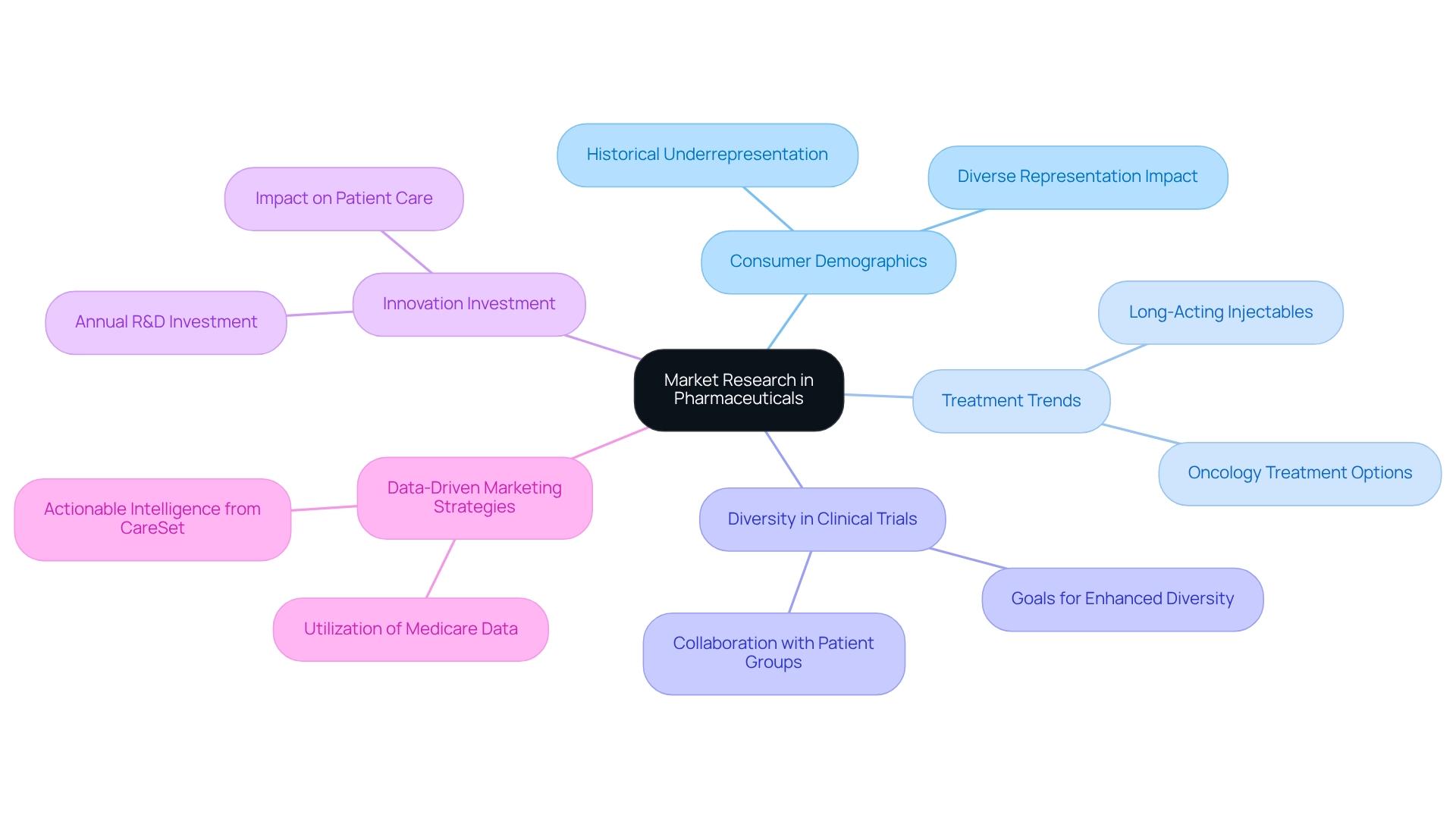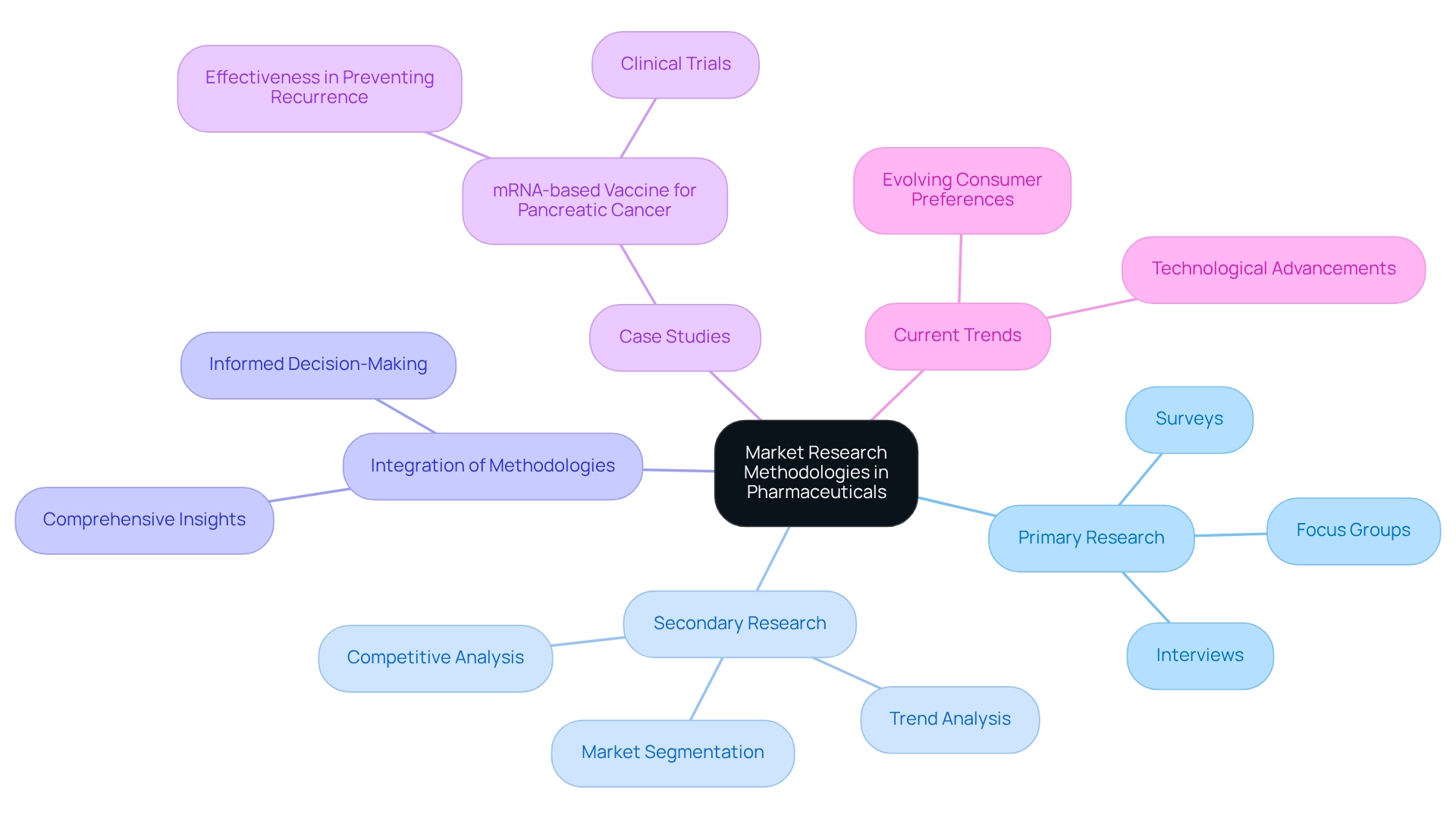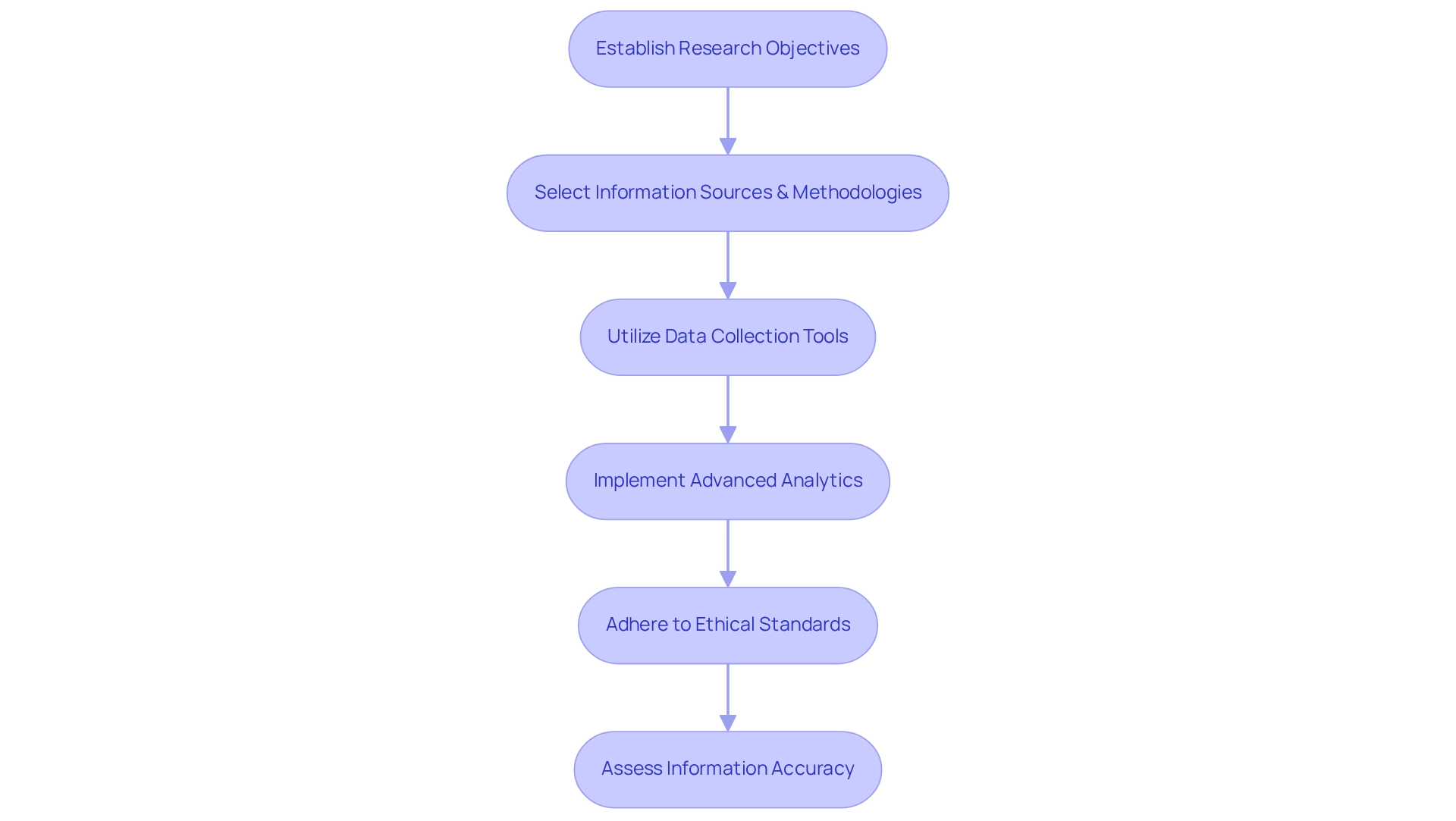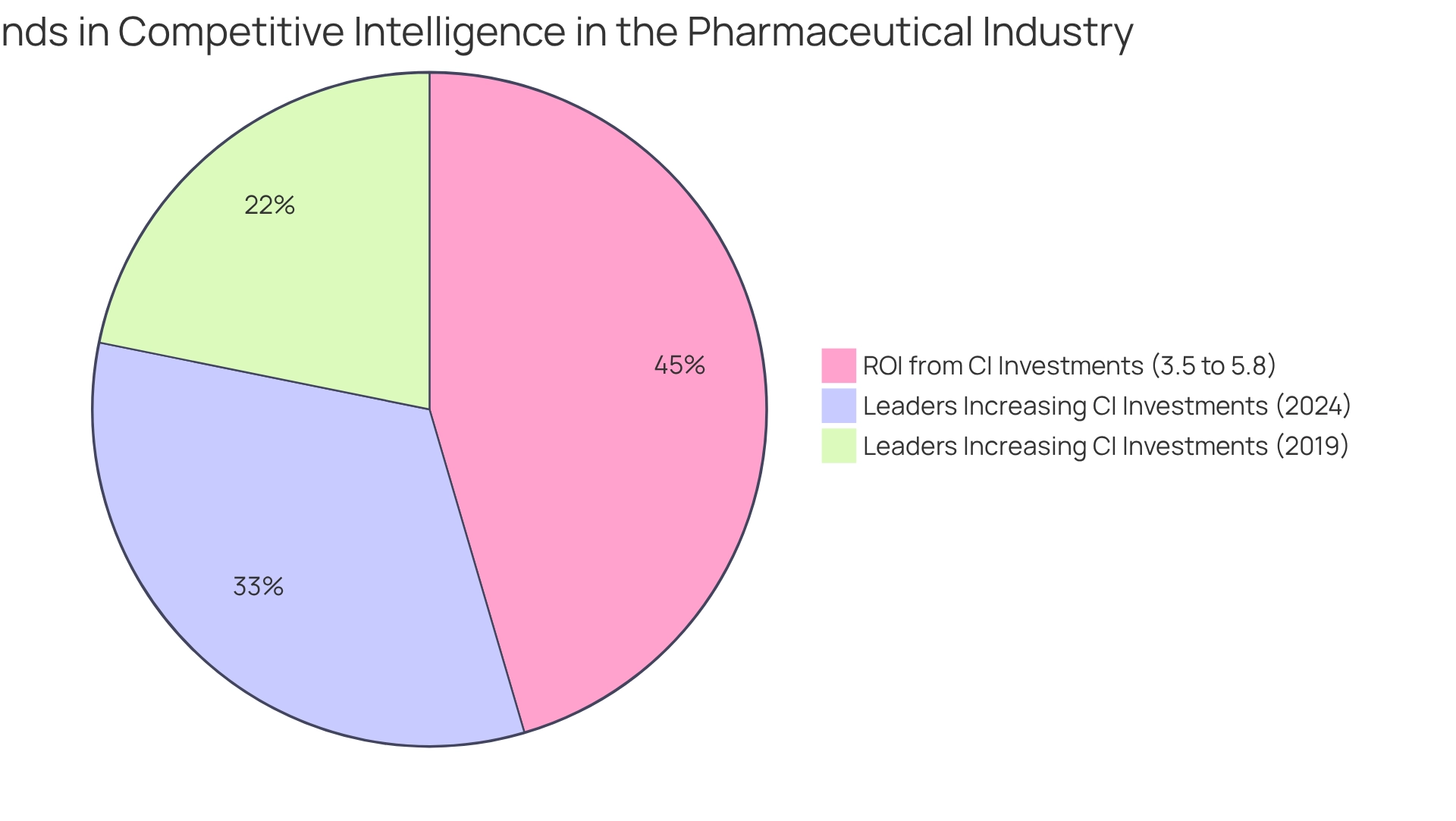Overview
Market research in the pharmaceutical industry stands as a cornerstone for strategic success. It delivers critical insights into consumer demographics, treatment trends, and competitive dynamics, which empower companies to tailor their products and marketing strategies effectively. Notably, thorough market analysis not only identifies unmet medical needs and emerging trends but also enhances decision-making processes. This ultimately leads to improved patient outcomes and fosters innovation within the sector.
Introduction
In the pharmaceutical industry, the stakes are exceptionally high; understanding the market landscape is essential for success. Market research emerges as a vital tool for companies striving to navigate the complexities of patient needs, treatment patterns, and competitive dynamics. By harnessing insights derived from rigorous research, pharmaceutical firms can innovate and tailor their offerings to address unmet medical needs. This not only improves patient outcomes but also enhances their market position.
As the industry evolves, the emphasis on robust market research methodologies becomes increasingly critical, especially in light of the ongoing push for diversity in clinical trials and the rising demand for effective healthcare solutions. This article delves into the significance of market research in pharmaceuticals, exploring key methodologies, data collection techniques, and the interpretation of findings to drive strategic decision-making.
Understand the Importance of Market Research in Pharmaceuticals
Industry analysis, including market research in the pharmaceutical industry, stands as a cornerstone of success, delivering essential insights into consumer demographics, treatment trends, and industry dynamics. By leveraging insights gained from market research in the pharmaceutical industry, companies can effectively tailor their products and marketing strategies to meet the specific needs of healthcare providers and individuals. For instance, identifying unmet medical needs through thorough investigation can lead to the development of innovative treatments that address pressing health challenges. Furthermore, conducting market research in the pharmaceutical industry is crucial in evaluating the competitive landscape, enabling firms to strategically position their products against competitors. In 2025, the significance of market research is underscored by the finding that over 61% of surveyed pharmaceutical companies have set objectives to enhance diversity in clinical trials, acknowledging that diverse representation can profoundly influence patient outcomes and financial performance. This is particularly relevant given the historical underrepresentation of certain demographics in clinical trials, which can skew results and limit the applicability of findings.
CareSet’s extensive Medicare information solutions, encompassing insights from over 62 million beneficiaries and 6 million providers, empower pharmaceutical companies to enhance their engagement with healthcare providers. A recent case study on oncology treatment options exemplifies how utilizing Medicare data can foster timely and meaningful interactions with physicians regarding treatment options like Qinlock for Gastrointestinal Stromal Tumor (GIST). This data-driven approach not only informs marketing strategies but also aligns with the industry’s commitment to improving patient care.
The U.S. pharmaceutical sector invests over $40 billion annually in innovation and development, reflecting the industry’s dedication to understanding consumer needs and improving patient care. This substantial investment is founded on insights gained from market research in the pharmaceutical industry that help companies identify opportunities and address challenges. As demand for STEM-related positions surges by 20%, the challenge of attracting technical talent underscores the need for comprehensive analysis to inform hiring and training strategies. This foundational understanding is vital for making informed decisions that not only enhance product success but also improve patient outcomes, particularly through market research in the pharmaceutical industry within an increasingly complex healthcare landscape. Moreover, the ongoing evolution of long-acting injectables in pulmonary arterial hypertension illustrates how industry analysis can reveal emerging trends and opportunities within the pharmaceutical domain. According to the U.S. Food and Drug Administration (FDA), understanding the regulatory landscape is essential for navigating the complexities of drug approval processes, making analysis an indispensable tool for pharmaceutical firms striving for success.

Explore Key Market Research Methodologies
The techniques used for market research in the pharmaceutical industry are primarily categorized into two types: primary and secondary studies.
Primary investigation in the context of market research in the pharmaceutical industry involves the direct gathering of new information through methods such as surveys, interviews, and focus groups. This approach provides tailored insights that align closely with specific research objectives, facilitating a deeper understanding of industry needs and consumer preferences, which is essential in market research in the pharmaceutical industry.
Conversely, secondary research focuses on analyzing existing data sourced from reports, studies, and databases. This phase employs techniques such as competitive analysis, market segmentation, and trend analysis, which are crucial for obtaining a broader view of market dynamics in market research in the pharmaceutical industry. For example, leveraging secondary data from Medicare claims can uncover prescribing patterns and demographic insights, offering invaluable perspectives on treatment behaviors and healthcare trends.
CareSet’s monthly Medicare updates enhance provider engagement by delivering innovative insights into drug utilization and care navigation, effectively mapping the journey from diagnosis to treatment across Medicare A, B, and D benefits. These updates address essential questions relevant to market research in the pharmaceutical industry, such as which diseases providers diagnose and treat, how patients navigate their treatment journey, and what treatments Medicare Part D Plans are approving.
The integration of both methodologies often yields the most comprehensive insights. Current trends indicate that the pharmaceutical sector is increasingly relying on advanced analytics and technology to refine investigative methodologies within market research in the pharmaceutical industry. As highlighted by Fortune Business Insights, the growing challenge of under-diagnosis of diseases and the rising demand for effective products in developing countries are expected to drive product adoption within the sector.
Furthermore, the recent FDA authorization of Novo Nordisk A/S’s Ozempic 2.0 mg for managing type 2 diabetes illustrates how impactful analysis can influence product development and approval processes. Additionally, the case study of the mRNA-based vaccine for pancreatic cancer exemplifies how pioneering investigative methods can lead to significant advancements in treatment and industry understanding, with six out of eight patients remaining cancer-free for three years.
As the demand for pharmaceuticals escalates, propelled by shifting consumer preferences and technological progress, companies must adapt their market research in the pharmaceutical industry accordingly. This dual approach not only enriches the information landscape but also fosters informed decision-making, ultimately resulting in more effective market access and product launch strategies, bolstered by CareSet’s comprehensive Medicare insights. Importantly, CareSet identifies 15% more targets and 250% more patients than leading claims vendors, enhancing its value proposition.

Implement Effective Data Collection and Analysis Techniques
To implement effective information gathering and analysis techniques, it is essential to begin by establishing clear research objectives. This foundational step will guide the selection of suitable information sources and methodologies. Utilizing tools such as online surveys and advanced analytics software is crucial for effective information collection and examination. For instance, statistical programs like SPSS or R enable intricate analyses, allowing the discovery of trends and correlations within the information.
In 2025, market research in the pharmaceutical industry is increasingly adopting innovative information collection techniques, including real-time information capture and integrated information management systems, which significantly enhance the accuracy and timeliness of insights. Organizations that embrace comprehensive information management solutions, like those offered by CareSet Systems, can shorten their drug development cycle by approximately 1.5 years and boost their chances of regulatory approval by 23%. CareSet’s advanced Medicare data analytics empowers life sciences companies by providing actionable insights that enhance provider targeting and access to individuals, ultimately improving care.
Adhering to ethical standards and regulatory requirements is paramount, particularly when handling sensitive patient information. As emphasized in industry discussions, “Adhering to ethical standards is not merely a regulatory obligation; it is crucial for sustaining trust and integrity in pharmaceutical studies.” Consistently assessing and verifying your information guarantees its precision and dependability, which are essential for making sound conclusions.
Case studies demonstrate that advanced analytics implementations, such as those from CareSet, can lead to substantial improvements in patient outcomes, with findings indicating a 30-35% reduction in patient complications and a 10% decrease in mortality rates. This highlights the transformative potential of effective information analysis in the pharmaceutical sector, as market research in the pharmaceutical industry can drive innovative solutions and enhance customer experiences. By adopting current best practices and expert guidance on information gathering methods, organizations can elevate their analysis capabilities and propel strategic success.
Discover CareSet’s analytics solutions today to identify more physicians and accounts that can benefit from these insights.

Interpret Research Findings to Drive Strategic Decisions
Interpreting study results is crucial for aligning information with strategic goals and grasping the broader context of market research in the pharmaceutical industry. Begin by summarizing key insights and pinpointing patterns that resonate with your strategic objectives. Utilizing visual aids, such as charts and graphs, significantly enhances clarity when presenting data to stakeholders. For instance, if research indicates a rising demand for a particular therapy, emphasizing this trend in your presentations can bolster strategic initiatives.
Moreover, consider how your findings impact product development, marketing strategies, and consumer engagement efforts. Engaging stakeholders in discussions about these insights fosters collaboration and ensures that data-driven conclusions are effectively woven into decision-making processes. Notably, 72% of pharmaceutical leaders plan to increase investments in competitive intelligence (CI) capabilities, up from 48% in 2019, highlighting a growing recognition of the importance of market research in the pharmaceutical industry for enhancing operational efficiency and strategic success. CareSet’s extensive healthcare information insights can empower your business by offering actionable details that enhance your understanding of patient needs and market dynamics. As Josh Wills, a data specialist and engineer, emphasizes, ‘You’ll need to master both statistics and engineering,’ underscoring the vital role of analytical skills in interpreting findings from studies.
Additionally, hands-on learning opportunities, such as free data analytics courses, can assist individuals in starting their journey in the field, providing practical guidance for enhancing data interpretation skills, particularly in the context of market research in the pharmaceutical industry. Case studies illustrate that pharmaceutical firms implementing comprehensive CI programs typically achieve returns on investment (ROI) ranging from 3.5 to 5.8, showcasing the financial benefits of leveraging insights from studies. These returns directly influence strategic decisions, underscoring the importance of analyzing study results. As you interpret research findings, keep in mind that effective data visualization not only aids comprehension but also amplifies the persuasive power of your presentations, ultimately steering strategic decisions in market research in the pharmaceutical industry.

Conclusion
In conclusion, a robust market research framework is essential for the pharmaceutical industry, as it not only identifies opportunities but also addresses unmet medical needs. Embracing comprehensive data collection and analysis techniques is paramount; companies that leverage innovative tools and establish clear research objectives can significantly enhance the accuracy and timeliness of their insights. Moreover, ethical considerations and compliance with regulations are critical in maintaining research integrity, fostering trust among stakeholders. By prioritizing effective data management and interpretation, organizations position themselves to make strategic decisions that align with market demands.
Ultimately, by harnessing the power of data, pharmaceutical companies can innovate their offerings and elevate patient care, securing a competitive edge in an increasingly complex healthcare landscape. The future of success in this industry hinges on a commitment to informed decision-making, driven by thorough, data-backed insights. As the market evolves, the imperative to adapt and respond to patient needs through rigorous research becomes not just a strategy, but a necessity.


